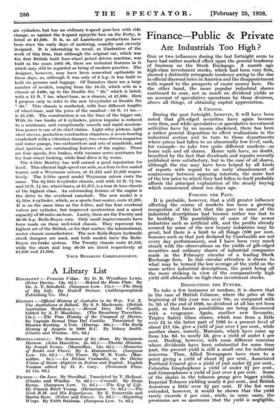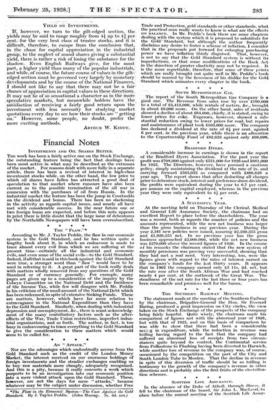Finance-Public & Private
Are Industrials Too High ?
ONE or two influences during the last fortnight seem to have had rather marked effect upon the general tendency of business on the Stock Exchange. A month ago high-class investment stocks, which had been very firm, showed a distinctly retrograde tendency owing to the rise in official discount rates in America and the disappointment with regard to the prospects of easier money here. On the other hand, the more popular industrial shares continued to soar, not so much on dividend yields as on account of speculative operations by those desirous, above all things, of obtaining capital appreciation.
A CHANGE.
During the past fortnight, however, it will have been noted that gilt-edged securities have again become very firm, and while speculative or speculative investment activities have by no means slackened, there has been a rather general disposition to effect realizations in the industrial section and to turn to those departments where prices had fallen to an abnormally low level, such, for example-to take two quite different markets-as home rails and oil shares. Home rails have, no doubt, benefited by the fact that dividends and reports recently published were satisfactory, but in the case of oil shares, although the rise may have been helped by all kinds of reports with regard to an early abandonment of controversy between opposing interests, the mere fact of the low price to which they had fallen in itself probably affords the principal explanation of the steady buying which commenced about ten days ago.
FORCING THE PACE.
It is probable, however, that a still greater influence affecting the course of markets has been a growing recognition of the fact that the pace in some of the industrial descriptions had become rather too fast to be healthy. The possibilities of some of the newer industries such as artificial silk, and the profits already secured by some of the new luxury industries may be great, but there is a limit to all things (100 per cent. bonuses such as that just declared by Courtaulds are not every day performances), and I have been very much struck with the observations on the yields of gilt-edged securities and ordinary shares of industrial companies made in the February circular of a leading Stock Exchange firm. In this circular attention is drawn to what may be termed the low average of the yield on the more active industrial descriptions, the point being all the more striking in view of the comparatively high yield still obtainable on high-class investment stocks.
DISCOUNTING THE FUTURE.
To take a few instances at random, it is shown that in the case of British Celanese, where the price at the beginning of this year was over 70s. as compared with 5s. 9d. at the end of 1926, no dividend at all has yet been paid, so that future possibilities are being discounted with a vengeance. Again, another new favourite, Triplex Safety Glass shares, which rose from a little over £2 in the latter part of 1926 to a present level of about £11 15s. give a yield of just over 1 per cent., while another share, namely, Marconis, which have come up from 14s. 6d. to nearly £3, give a yield of under 1 per cent. Dealing, however, with some different concerns where dividends have been substantial for some time -past, the present yield is still a small one for industrial concerns. Thus, Allied Newspapers have risen to a point giving a yield of about 81 per cent., Associated Portland Cement give a yield of just under 21 per cent, Columbia Graphophone a yield of under 21 per cent., and Gramophones a yield of just over 4 per cent. Some of the shares in the tobacco group give bigger yields, Imperial Tobacco yielding nearly 6 per cent., and British American a little over 51 per cent. If the list were extended, however, it would be shown that the yield rarely exceeds 5 per cent., while, in "some cases, the premiums are so enormous that the yield is negligible,
YIELD ON INVESTMENTS.
If, lioNvever, we turn to the gilt-edged, section, the yields may he said to range roughly from 44 up to--41...Per cent. for the very best class of trustee stocks, and it is' difficult, therefore, to escape from the conclusion that in the chase for capital appreciation in, the industrial: gronp, to the neglect of sound shares giving a substantial • yield, there_ is rather a risk of losing the substance for-the shadows Even English Railways give, for the most part, a higher yield than many of the popular industrials,' and-While, olcOurse, the future course of values in the gilt- edged section must be governed very largely by monetary: developthents and by the course of the National Pinances,: I should not like to say that there may not' be a fair; chance of appreCiation in capital values in these directions. It may not be of the more`
r
SO sensational a chaacter as in , speculative_ marketS, but meanwhile holders` have the satiaaCtion of receiving a fairly good return upon the' investment with less necessity for studying market quotations every day to see how their stocks are " getting on" HoWever, some people, no doubt, prefer the more exciting methods.
ARTHUR W. KIDDY.









































 Previous page
Previous page